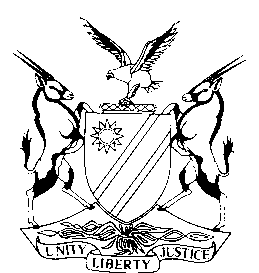REPUBLIC OF NAMIBIA

HIGH COURT OF NAMIBIA NORTHERN LOCAL DIVISION
HELD AT OSHAKATI
REVIEW JUDGMENT
Case No.: CR 44/2020
In the matter between:
THE STATE
v
MATHEUS ERASTUS ACCUSED
(HIGH COURT NLD REVIEW CASE REF NO: 202/2020)
Neutral citation: S v Erastus (CR 44/2020) [2020] NAHCNLD 115 (27 August 2020)
Coram: DIERGAARDT AJ et SALIONGA J
Delivered: 27 August 2020
Flynote: Criminal reviews- Questioning in terms of s 112(1) (b) of the CPA - Must ask all the questions necessary to admit to elements of the offence charged- Accused did not admit all the elements of the offence - Matter remitted back to magistrate court-Review upheld.
Summary: The accused was convicted of Assault by threat read with the provisions of the Combating of Domestic violence Act, Act 4 of 2003 and sentenced to 24 months imprisonment without the option of a fine.
After the plea of guilty the accused was questioned in terms of s 112 (1) (b). The appeal court believes that questions in terms of s 112 (1) (b) are there to ascertain whether the accused admits to all the allegations in the charge. The court of appeal is not satisfied that the accused admitted to all the elements of the charge.
The matter is remitted back to the Magistrates court. The conviction and sentence are accordingly set aside.
ORDER
Conviction and sentence with respect to the accused are hereby set aside.
The record is returned to the magistrate in terms of s 312 of the Criminal Procedure Act 51 of 1977 and the magistrate is directed to comply with the provisions of s 112 (1) (b) by questioning the accused afresh.
In the event of a conviction, the magistrate must in considering an appropriate sentence have regard to the fact that the accused has been serving a term of imprisonment since 3 July 2020 when the sentence was imposed.
REVIEW JUDGMENT
DIERGAARDT AJ (SALIONGA J concurring):
[1] The accused was convicted of Assault by threat read with the provisions of the Combating of Domestic violence Act, Act 4 of 2003 and sentenced to 24 months imprisonment without the option of a fine.
[2] I directed the following query to the learned magistrate:
‘On what basis was the court satisfied that the accused person admitted all the elements of the offence and whether the accused admitted to wrongfulness and unlawfulness .I also queried the magistrate on which offence the accused pleaded if there were no questions asked pertaining to what he exactly pleaded on after he indicated that he was the one who committed the offence’.
[3] The learned magistrate replied as follows:
‘Ad para 2
In my opinion I understood that the accused pleaded to the offence charged as outlined in Annexure “A”. I could not find anything else to suggest that the accused denied the charge. However, I concede that the follow up questions would have been in order to the effect that the accused would have been given the opportunity to say exactly what he did and/or said to the complainant.
AD para 3
As presiding officer, I was satisfied the accused admitted to all elements of the offence which was read out to him in court and the accused admitted that he understood the charge he was facing. Further, the accused followed up by saying: “I plead guilty because I am the one who committed the offence,” Thus the accused admitted to all the elements of the offence he was charged with including wrongfulness and unlawfulness.
AD para 4
Further, the complainant was called by the state in aggravation of sentence, and that the accused was her grandson and that the accused on several occasions (‘many times’) threatened to kill her by cutting her neck and arms’.
[4] The magistrate further concedes that he could have posed further questions to the accused but he did not and he apologised for that.
[5] I am of the view that questions in terms of s 112 (1) (b) are there to ascertain whether the accused admits all the allegations in the charge.
[6] The said questioning must cover all the essential elements of the offence which the State in the absence of a plea of guilty would have been required to prove (See S v Mhkize 1978 (1) SA 264 (N) 267) and the answers must amount to admissions.
[7] I fully agree with the sentiment shared in the case of S v Valede & others 1990 NR 81 (HC) at Pg. 84, where Levy J made the following remarks:
‘The magistrate's questioning must be directed at ascertaining those facts for him, the magistrate, to decide whether the conclusion of law or opinion of the accused is justified.’ At page 3, para 12 of the record, the accused admitted that he committed the offence, there was no further questioning on the details of how and which offence was committed. I am thus convinced that the accused was not questioned properly so as to ascertain the facts necessary to prove a charge.
[8] In view of the above, I am not satisfied that the accused admitted all the elements of the offence. Therefore, the conviction cannot be allowed to stand.
[9] In the result, the following order is made:
Conviction and sentence with respect to the accused are hereby set aside.
The record is returned to the magistrate in terms of s 312 of the Criminal Procedure Act, Act 51 of 1977 and the magistrate is directed to comply with the provisions of s 112 (1) (b) by questioning the accused afresh.
In the event of a conviction, the magistrate must in considering an appropriate sentence have regard to the fact that the accused have been serving a term of imprisonment since 3 July 2020 when the sentence was imposed.
_____________________
A H Diergaardt
Acting Judge
I agree,
_____________________
J T Salionga
Judge